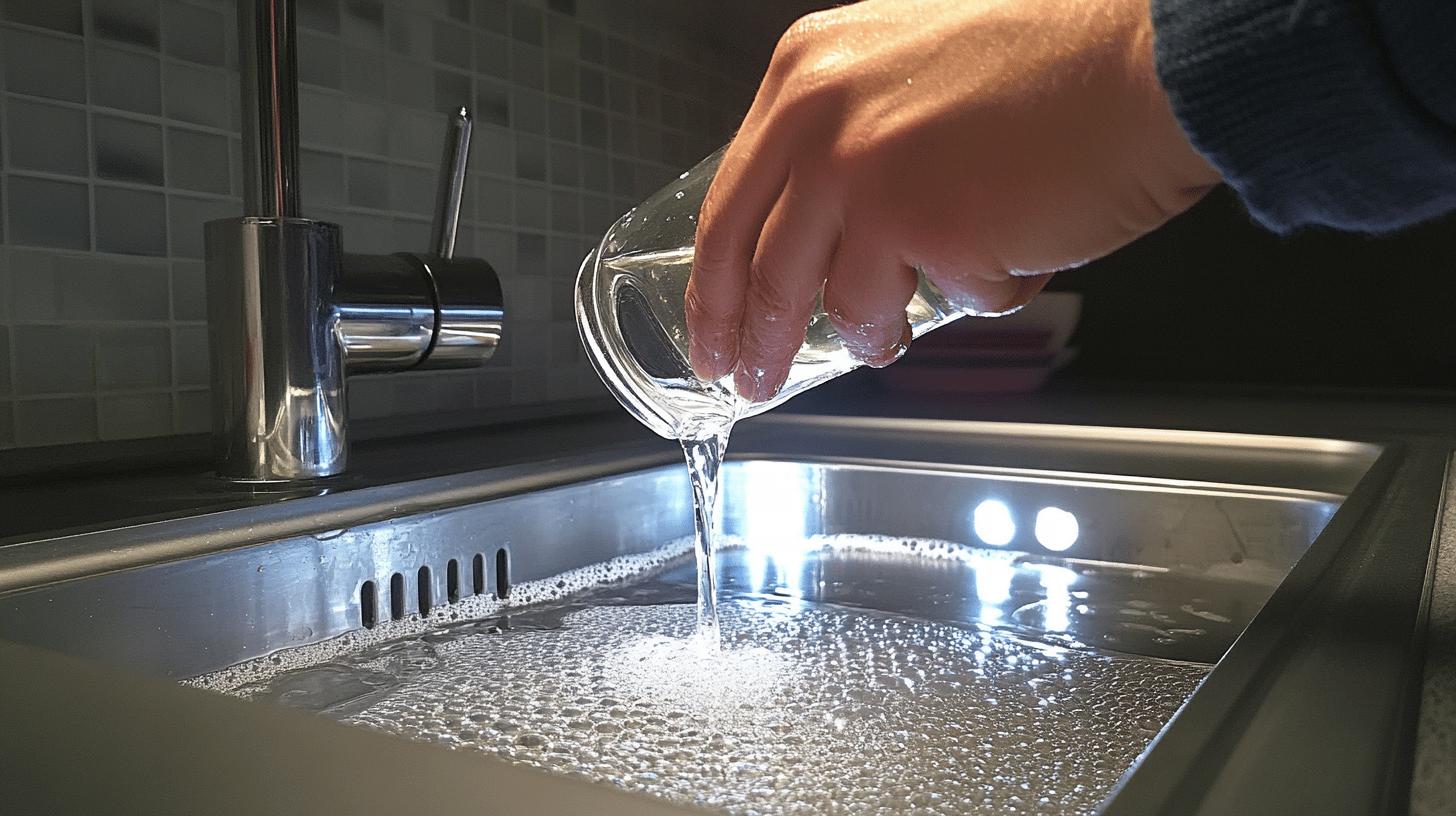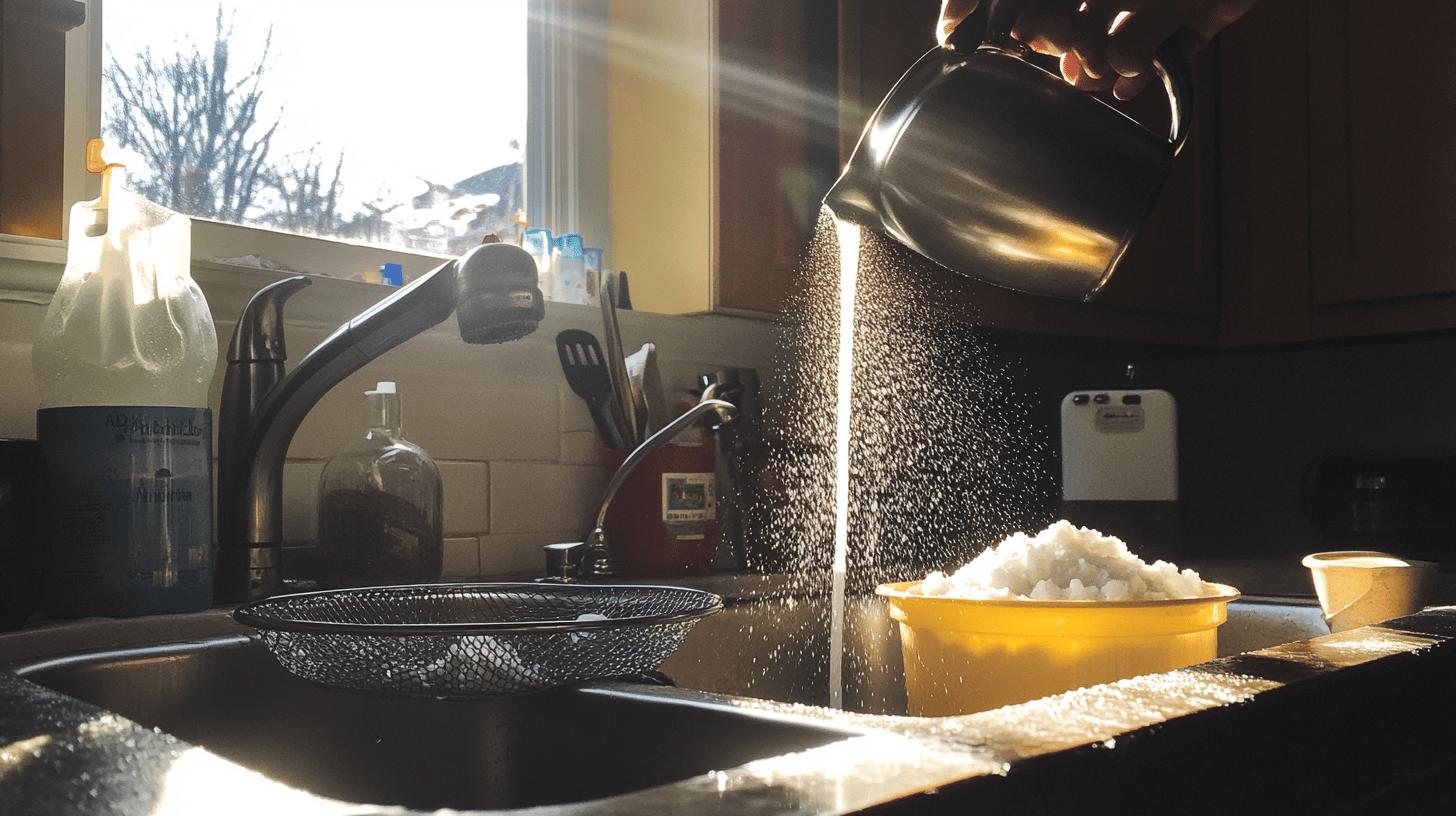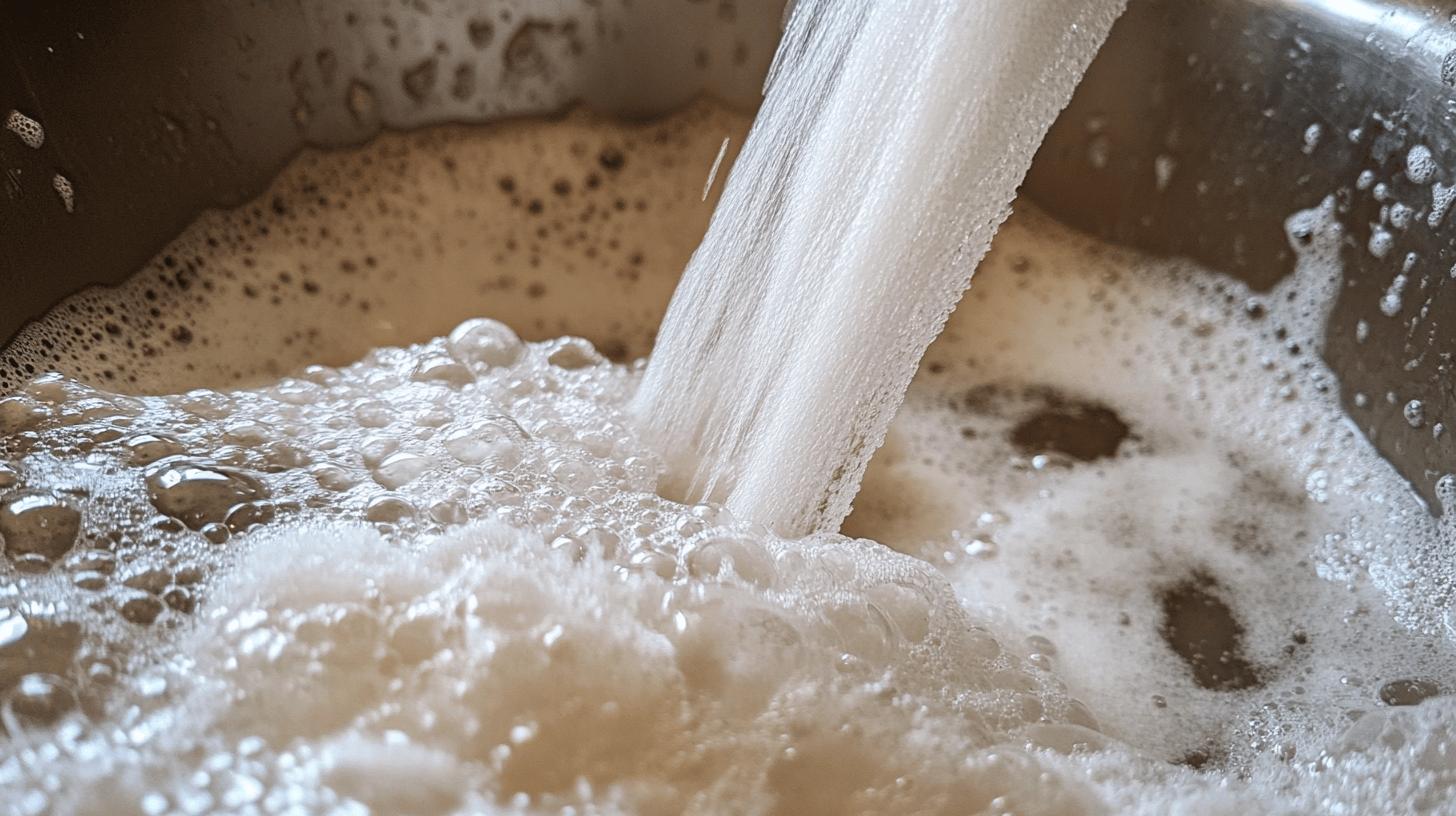TL;DR:
-
Use baking soda and vinegar as a natural drain cleaner by:
- Boiling water and pouring it down the drain.
- Adding 1 cup of baking soda.
- Following with 1 cup of vinegar and allowing to fizz for 5 minutes.
- Flushing with more boiling water.
-
Regular maintenance tips:
- Flush weekly with hot water.
- Use drain strainers; avoid pouring grease down the sink.
-
Safety tips:
-
Wear gloves, measure accurately, ensure ventilation, and don’t mix with chemicals.
-
Call a plumber for severe clogs or if DIY methods fail.
-
Alternative natural methods: Use lemon juice, salt, or cream of tartar with baking soda for minor clogs.
Can baking soda and vinegar clear out the gunk in your drains? Totally! This simple mix packs a punch without any harsh chemicals. When you combine them, they fizz up and help break down clogs, keeping water flowing smoothly. In this article, you’ll get the lowdown on how it works, step-by-step instructions, and when it might be time to call a plumber. If you’re looking for an eco-friendly way to keep drains clear, this method is a winner.
Effective Drain Cleaning with Baking Soda and Vinegar
Cleaning drains with baking soda and vinegar is an easy, natural solution. These everyday items team up to tackle clogs without harsh chemicals. When they mix, they fizz up and help break apart blockages, letting water flow smoothly again. This method not only clears your drains but also keeps your pipes safe from damage.
- Boil water and pour it into the drain.
- Add a cup of baking soda.
- Follow with a cup of vinegar.
- Wait for the fizzing to stop.
- Rinse with more boiling water.
Baking soda and vinegar work well for regular drain upkeep and small clogs, but they might not handle serious blockages. For tough clogs, it’s best to call a plumber to avoid damaging your pipes. Pros have the tools and know-how to fix bigger plumbing issues that DIY solutions can’t tackle.
Step-by-Step Guide to Unclogging Drains with Baking Soda and Vinegar

Preparing the Drain
Before you start unclogging, it’s key to prep the drain. Why get rid of standing water? It lets the cleaning solution hit the clog directly. First, heat a pot of boiling water, then add some grease-fighting dish soap to the drain and pour in the hot water. This step helps break down any greasy buildup causing the blockage.
Using Baking Soda and Vinegar
Once the drain is prepped, it’s time for the natural cleaners. How do you use them? Pour a cup of baking soda into the drain (use a funnel if it’s messy), then slowly add a cup of vinegar. It’ll start fizzing right away—that’s the reaction! Let it sit for at least five minutes so it can work on the clog.
Final Flush and Repeat
When the fizzing stops, finish up with a flush of boiling water to clear out any leftover debris. Why do this? Flushing helps wash away loosened particles so the drain doesn’t clog up again. Boil another pot of water and pour it down. If it’s still draining slowly, you can repeat the process. For really tough clogs, call a plumber to avoid damaging your pipes.
Safety Tips for Using Baking Soda and Vinegar for Drain Cleaning
Safety first when using baking soda and vinegar for drain cleaning! Why keep the area well-ventilated? It prevents you from breathing in any irritating fumes. Stick to the right amounts to avoid messy fizzing or potential pipe damage. Measuring carefully keeps things under control and makes the reaction safe. This method works well, but a little caution goes a long way to protect both you and your home.
- Wear gloves and eye protection.
- Measure ingredients accurately.
- Ensure good ventilation.
- Do not mix with other chemical cleaners.
When should you call a plumber? If baking soda and vinegar don’t clear the clog, it’s time for professional help. Stubborn blockages could point to bigger issues that need specialized tools and expertise. Trying to fix it on your own might damage your pipes or make things worse, but a plumber can provide lasting solutions.
Complementary Practices for Maintaining Clear Drains

Why is regular maintenance so important? It helps stop debris and grease from building up, which can cause clogs. Keeping your drains clear lowers the chances of major blockages that mess with your plumbing. Simple weekly steps, like flushing with hot water and dish soap, break down minor grease and keep things flowing smoothly. This proactive approach keeps your drains working well and odor-free.
- Flush weekly with hot water.
- Use drain strainers.
- Don’t pour grease down the sink.
What are the benefits? These habits keep your drains clear and can help your plumbing last longer. Drain strainers catch big debris, like food or hair, before they clog pipes. Avoiding grease disposal stops it from solidifying and causing tough blockages. By adopting these practices, you’ll have a cleaner, more efficient drainage system.
When should you call a plumber? If you’re dealing with recurring clogs or slow drainage, it’s time to consult a plumber. They have the tools and expertise to fix issues that natural methods can’t. Getting a professional assessment prevents damage and keeps your plumbing in great condition.
Alternative Natural Methods for Drain Cleaning
Why use alternative natural methods? They’re safer and more eco-friendly than harsh chemicals. These methods protect your plumbing and reduce toxic exposure and environmental damage. Ingredients like lemon juice, salt, and cream of tartar mixed with baking soda work well for clearing minor blockages. This sustainable approach keeps your drains clean without using chemicals.
- Lemon juice and baking soda.
- Salt and baking soda overnight.
- Cream of tartar with baking soda.
When should you contact a plumber? If natural methods don’t work, it’s time to call in a pro. Serious clogs usually require special tools and expertise. Home remedies might not do the trick or could make things worse. A plumber can properly diagnose the problem and provide a lasting solution, keeping your plumbing running smoothly and avoiding expensive repairs.
Final Words
Baking soda and vinegar offer a natural and effective way to clean drains, providing a simple, eco-friendly alternative to harsh chemicals. This combo breaks down clogs, making it easy to handle minor plumbing issues at home. However, for stubborn blockages, you might still need a plumber’s expertise. By keeping up with regular maintenance and knowing when to call in a professional, you can keep your drains clear and efficient over time. Use this natural method for a cleaner, safer home.
FAQ
Q: Is it safe to use vinegar and baking soda to clean drains?
A: Using vinegar and baking soda is safe for drain cleaning. This combination creates a natural chemical reaction that helps clear clogs without harsh chemicals.
Q: What is the best homemade drain cleaner?
A: A popular homemade drain cleaner is using baking soda and vinegar. This simple mixture effectively cleans drains by breaking down residue and clogs naturally.
Q: What is the ratio of baking soda to vinegar to clean a drain?
A: The effective ratio for drain cleaning is one cup of baking soda followed by one cup of vinegar. This proportion helps ensure a productive fizzing reaction.
Q: Why should you never use baking soda and vinegar to unclog a drain?
A: Some argue against using baking soda and vinegar due to its limited effectiveness on stubborn clogs and potential damage to old pipes. Professional advice is recommended for severe blockages.
Q: Can you leave baking soda and vinegar in a drain overnight?
A: Leaving baking soda and vinegar in the drain overnight increases the cleaning duration and can help loosen stubborn clogs for easier removal.
Q: Why pour salt down the drain?
A: Pouring salt can help unclog drains by acting as an abrasive agent. It can be mixed with baking soda and hot water to enhance cleaning effectiveness.

